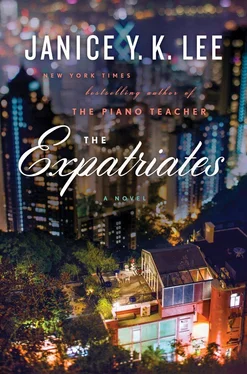MEETING CHARLIE FOR sushi at a small place on Jervois Street the next day, he is cheerful, ebullient, a puppy eager to please.
“I thought you were one of those girls who only like to go out with white guys,” he says, grinning. He assumes all is well, can’t read her hesitation. She is out with him, hence she must be into him. He is that young. When do boys catch up to girls? she wonders. Maybe never.
“I don’t really have a policy,” she says.
“But you dated mostly white guys in college, right?” he asks.
“I didn’t date all that much,” she says. “More like hook up. Nothing serious.”
This boy is earnest and sweet. He wants a girlfriend. “You’re not drinking,” he says.
“I’m hung over,” she says, which is true. She wonders if she’s already scrambled the cells of her unborn child.
“Did you have fun last night?” He pours himself some more sake from the small porcelain flask. He knows enough to order it cold.
“Yeah,” she says. She spent the day with her mother, making Korean banchan from the groceries her mother had bought from the Korean market in Tsim Sha Tsui.
“What did you do today?”
Parrying his questions is so easy it’s like child’s play. “Such a boring topic!” she declares. “How’s work?”
And instead of saying, “And that’s not boring?” he starts telling her about work.
She listens. It is not unpleasant, being here with Charlie, having small pieces of fish set in front of them at intervals. This is another life, one she should be having.
But still, Charlie is so… unsophisticated. He didn’t hang out with her crowd in college and is so unknowing it makes her cringe sometimes.
His parents are middle class, his father a math teacher at a high school and his mother a lab technician.
“How’d you find your way to Columbia?” she asks.
“Recruiters came to my local school. I never thought about going abroad, thought that was only for rich people, but this woman said I could apply for a scholarship. Some tycoon families in Hong Kong give aid to local students, and that’s what I got, because it’s hard to get financial aid for international students.”
“You must have done really well in school,” she says. “Did you get a full ride?”
“Yes, full scholarship. But we still have to pay some items, like the airplane and all the things I need for living.”
His English is still a little bit foreign, with a bit of an accent that surfaces from time to time and grammar that can be off. He doesn’t get some jokes, doesn’t know anything about American television from the eighties and nineties, doesn’t understand colloquialisms but can speak pretty good English, so he seems like a blurred facsimile of an American.
“And you are from New York, right?”
“Queens,” she says. “Not Manhattan.”
He’s not surprised. He doesn’t expect anyone he knows to be from Manhattan.
“Big Koreatown there,” he says. “We used to go for Korean food sometime. Love the bulgogi .”
She debates telling him about her aunt’s restaurant. Maybe he’s been.
“And Chinese,” she says. “Lots of Chinese places. And Irish pubs.”
He looks blank. “Irish?”
She doesn’t explain. “But yeah,” she says. “My dad was in ‘business’”—she makes quotation marks in the air—“and my mom worked sometimes, so I needed a scholarship too.”
He nods.
“You know Philena, right?” she asks.
“So rich,” he says, dunking sushi in the soy sauce. He puts the rice side down in the soy sauce, incorrectly. You’re supposed to put the fish side in. “Her family owns all the buildings in Causeway Bay.”
“Did you know her before?”
“No, no,” he says. “Just meet in the U.S. And sometimes see her here but not much.”
“I was her roommate for a few years,” she tells him.
“I know,” he says.
So he knew of her then, even though she didn’t know about him. Her crowd was known at school as the fast crowd, the party crew, the cool ones. She remembers her old boss at the listings magazine telling her, “You may be twenty-five and think you know everything, but I am forty-three, and I am here to tell you that life is high school over and over again.”
After dinner, she wants to go home, but he doesn’t want the night to end. He suggests a drink.
“How about the Mandarin?” he says. It is not far, so they walk. She’s getting more and more antsy, not wanting to be there, walking next to the perfectly nice young man she can sense is wondering whether or not to take her hand. Thankfully, he doesn’t.
They get to the bar, all smoky mirrors and dark velvets, and he orders a gin martini and she orders a club soda. The alcohol, mixing with the sake he’s already had, makes him voluble, and he tells her about his family and childhood.
“My parents live in a three-hundred-square-foot apartment,” he announces. “I live in a flat that is twice the size of theirs.”
“How does that make you feel?” she asks.
“I don’t know,” he says, wheezing. His eyes are glassy, and he is starting to slur. This is reason enough to drink, so you don’t have to see others being idiots and have to tolerate them.
“They must be proud of you,” she says. “I think my parents are proud of me, and I don’t even have a job.”
“Proud because of Columbia?” he asks. “You were at Columbia, right? Not Barnard?”
“Yes,” she says. “And it’s not the same thing.” She expected him to join in as she said it, being such a familiar chorus, but he looks at her blankly. They teach a lot at Columbia, but what they can’t teach is irony and sophistication. What poor Charlie doesn’t realize is what potent currencies they are. All his hard work and intelligence are only going to take him so far.
“My parents didn’t even dream I could go to college in America,” he says. “I had to make it happen. I had to tell them it was possible.”
“And now you live in an apartment that’s twice the size of theirs,” she says.
The bartender shakes the martini and uncaps the flask, pouring the clear liquid glinting with slivers of ice into a chilled glass. He sets the remainder down next to the glass and replaces their nuts with a fresh bowl.
“Amazing service,” she says. She is starting to hate Charlie. It is a relief to feel this, as she has spent such a long time worrying that people hate her.
He takes a sip. “My parents act like they are not as good as Americans or British,” Charlie says suddenly. “So when you ask how I feel about the fact that I live in a larger place than them at the age of twenty-seven, I guess I feel that you have to believe in yourself if you want to succeed.”
Callow. The word floats into her head. Charlie is callow. Unknowing. Naïve. Earnest. And if she can see him for all those things, what does that make her?
They end up back at his place, an enormous apartment complex of tiny flats in Pok Fu Lam, filled with young professionals, a dorm of sorts for the financial sector. After he paid for the drinks, they got into a cab, and she did not disagree when he told the driver his address. His building has a health club, a swimming pool, and a dining room you can rent out for dinner parties. He shows her all the facilities with pride, as if he owns them.
He is starting to sober up.
“Want to go swimming?” she asks.
“The pool is closed,” he says.
“That’s not what I asked,” she says. “I said, would you like to go swimming?”
“Sure.” He nods. He tries the door. “It’s locked,” he says.
“Who has the key?” she says. This is what she’s good at: breaking rules, behaving badly. She can take the lead.
Читать дальше












